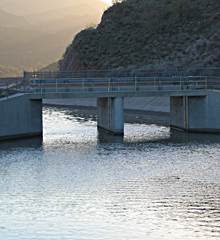
Ecosystem services are the benefits that people receive from their life-supporting environment. These include the “goods” that nature provides to us (i.e., food, water, fiber, energy) as well as soil fertility, air and water quality, pest control, recreation, and aesthetics. Natural systems deliver these services, but humans have also designed or engineered ecosystems to deliver specific services. This ecosystem design is a particular characteristic of cities.
CAP research has found both intended and unintended ecosystem services associated with highly engineered aquatic systems in the urban environment (e.g., systems for water delivery, storm water removal, and wastewater processing). Parks along a flood “greenway”, such as Indian Bend Wash in Scottsdale, Arizona, are an excellent example. In addition to their obvious recreational value and capacity to absorb or convey floods, these parks are also efficient at removing nutrients and contaminants from floodwater. Retention basins, established for flood management, double as recreational spaces and nutrient removal systems. Other engineered aquatic ecosystems, however, do not provide benefits beyond those for which they were originally designed (e.g., concrete stormwater spillways). Awareness of the potential benefits of ecosystem functions increases the potential for urban planners and policy-makers to design systems that optimize the ecosystem services delivered to the public.
Suggested references:
Grimm, N. B., S. H. Faeth, N. E. Golubiewski, C. R. Redman, J. Wu, X. Bai, and J. M. Briggs. 2008. Global change and the ecology of cities. Science 319:756-760. Abstract
Grimm, N. B., and C. L. Redman. 2004. Approaches to the study of urban ecosystems: The case of central Arizona – Phoenix. Urban Ecosystems 7(3):199-213. Abstract
Grimm, N. B., R.W. Sheibley, C. Crenshaw, C. N. Dahm, W. J. Roach, and L. Zeglin. 2005. Nutrient retention and transformation in urban streams. Journal of the North American Benthological Society 24:626-642. Abstract
Roach, W. J., and N. B. Grimm. 2009. Nutrient variation in an urban lake chain and its consequences for phytoplankton production. Journal of Environmental Quality 38:2439-1440. Abstract
Roach, W. J., J. B. Heffernan, N. B. Grimm, J R. Arrowsmith, C. Eisinger, and T. Rychener. 2008. Unintended consequences of urbanization for aquatic ecosystems: A case study from the Arizona desert. BioScience 58(8):715-727. Abstract


